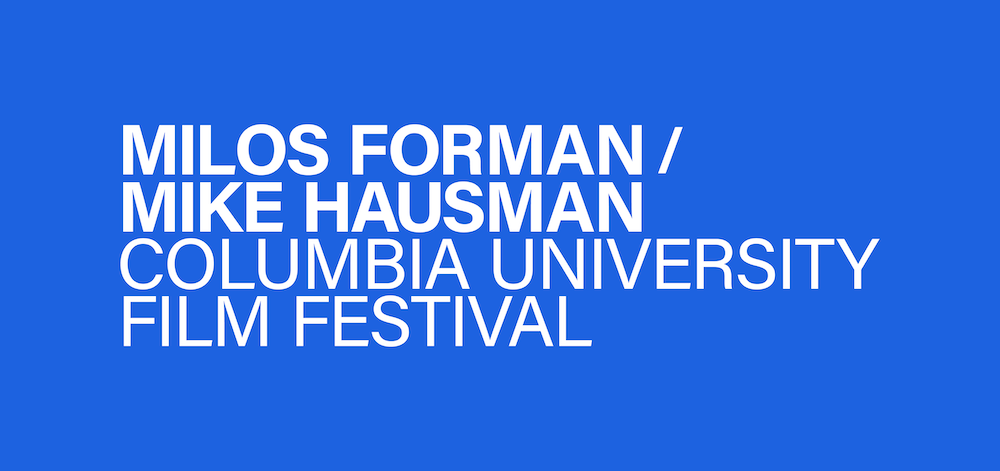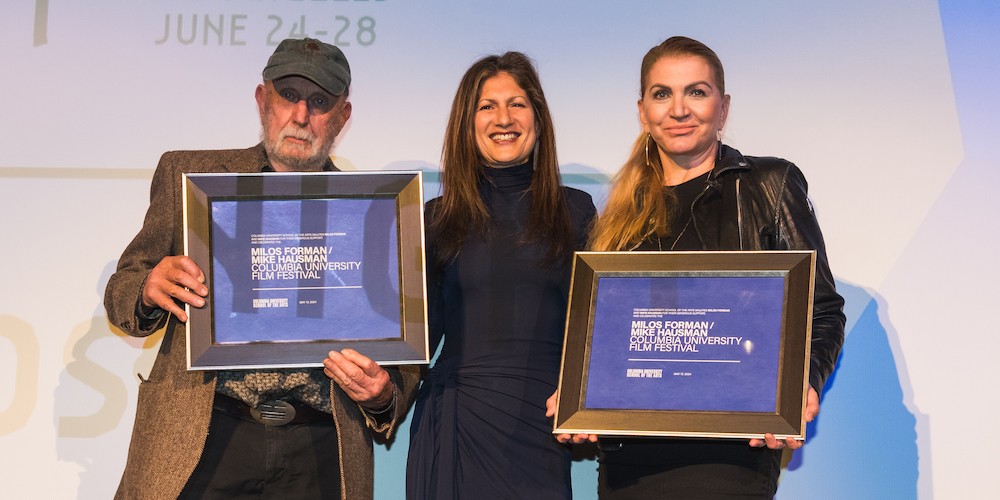CUFF Renamed: The Miloš Forman/Michael Hausman Columbia University Film Festival
The 36th annual Columbia Film Festival (CUFF) held its awards ceremony on May 13, 2024. In addition to recognizing the 41 films that premiered at the festival, Interim Dean Sarah Cole announced that beginning in 2025, the festival will be renamed the Miloš Forman/Michael Hausman Columbia University Film Festival, after former Film Chair, Miloš Forman and former professor Michael Hausman, who both had a hand in shaping the Film Program as it exists today.

After revealing the new festival logo, Dean Cole reiterated that the renaming is not only to honor the legacies of Hausman and Forman but also to recognize the generous monetary contributions granted by Forman's widow, Martina Forman, and Hausman, which will underwrite the festival in perpetuity.
“This incredible support ensures that our extraordinary festival, which is critical to the launching of all of our Film graduates, will go forward always,” Cole said. “So on behalf of Columbia University School of the Arts, thank you to [Hausman] and Martina for this generous tribute to collaboration, to friendship, to filmmaking, and to Columbia film. We know that today’s graduates and future students will draw inspiration from the extraordinary work and friendship of Miloš Forman and Mike Hausman.”
Forman started his career in the Czechoslovak New Wave in the 1960s, with films such as Black Peter (1964), Loves of a Blonde (1965), and The Firemen’s Ball (1967). After The Firemen’s Ball was censored and banned by Czech authorities, he moved to the U.S where he started directing more commercial films such as One Flew Over The Cuckoo’s Nest (1975). Following this, in 1978, he began working as a professor of Film at Columbia and soon became co-chair of the program alongside his former mentor František Daniel. Forman went on to direct films such as The People Vs. Larry Flynt (1996), and Amadeus (1984), on which he collaborated with Hausman.
Hausman, who regularly teaches at the School of the Arts, has also worked with directors David Mamet and Robert Benson, for whom he produced films such as Places in the Heart (1984), Nobody’s Fool (1994), and Twilight (1998). Other films Hausman has worked on include Gangs of New York (2002), Eternal Sunshine of the Spotless Mind (2004), and All The King’s Men (2006).
“I support the Columbia Film Festival because I want to encourage our students to keep at it, not give up and work for the telephone company,” Hausman said in a brief interview. “They should network with their fellow students because they’re the ones they’re gonna go on with like I did when I was in school.”
“Columbia film students have worked for literally years to get to this moment," said Film Chair and Associate Professor Jack Lechner, "and it’s our privilege and responsibility to honor their creativity tonight."
The 2024 five Jury Selects were: Bruno and Elena, produced by Zing (Zixin) Chen '23 and directed by Adjunct Assistant Professor Javier Hirschler ’23; The Loon, directed by Paula Bourgie ’22; Pillow Talk, produced by Kinder Labatt ’22 and directed by Adjunct Assistant Professor Mathilde Hauducoeur ’23; Victorine, produced by Danielle Dougé ‘22 and directed by Lunise Cérin '24; Youth, Youth, co-produced by Zixuan Wang ’23 and directed by Dong-Ren Hong ’23.
After the films screened, the student filmmakers took the stage to deliver a statement addressing recent student protests on campus. Cérin, who received the Lewis Cole Memorial Award for Excellence, said “Tonight we would like to offer to this community a reminder of who we are and what this university has always stood for. We stand for a love of life. We stand on the shoulders of giants like [Professor] Jamal Joseph of the Black Panther 21, or the late Milena Jelinek, an early protestor against the Soviet regime, of Lewis Cole who led the student protests in 1968 and built the Film department that brought us all here today.”
Cérin quoted Toni Cade Bambara: “The role of the artist is to make revolution irresistible.”
“Columbia University is no stranger to revolution,” Cérin continued. “When Columbia stands, the world moves. In return, we urge you to listen to the urgent demands of this community, for you to not remain complacent, to challenge the status quo, and continue to participate in this legacy of building a better world. Free Haiti, Free Congo, Free Sudan, and Free Palestine.”
The Best Film Award, which was sponsored by Good Behavior Films, was awarded to Paula Bourgie ’22 for her film The Loon, which depicts a friendship between Dodo and her spunky best friend Clara. During an Arcadian lakeside vacation at Clara’s parents’ cabin, Dodo gets jealous when Clara invites her crush over for the day. To win attention and Clara’s sympathy, Dodo conducts several impulsive schemes.
A Statement from Good Behavior Films congratulated all the filmmakers for completing and showcasing their films. “As for [The Loon]," the statement continued, "we loved the story, the visual language, and the performance of the two actors who play a complicated dynamic. It’s a fine example of a film full of Columbia Arts DNA.”
See a full list of CUFF Award winners here.
Film Chair and Associate Professor Jack Lechner with 2024 CUFF presenters
Best Film Winner Paula Bourgie
Film Chair and Associate Professor of Professional Practice Jack Lechner
Interim Dean Sarah Cole with Martina Forman and former professor Michael Hausman
